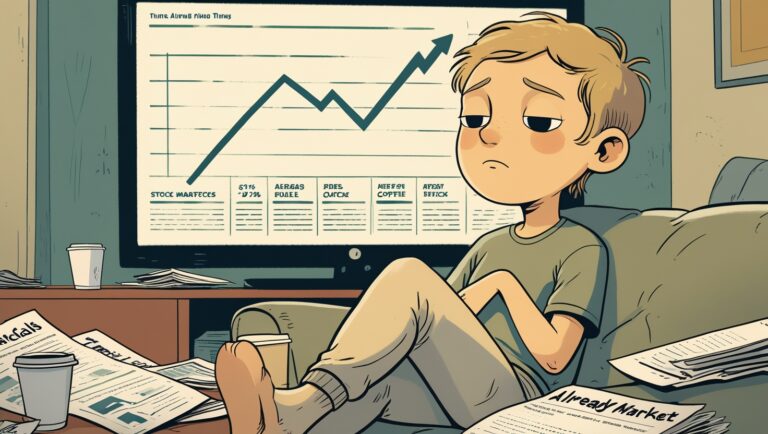The One Habit That Changed My Trading Forever
The One Habit That Changed My Trading Forever
If I had to credit one thing for turning my trading around, it wouldn’t be an indicator, a signal group, or some secret strategy. It would be a habit — one simple habit — that completely shifted how I trade, how I think, and how I grow as a trader.
That habit? Journaling every single trade.
It might sound boring or even unnecessary, but I’m telling you — this one habit changed my trading forever.

Table of Contents
I Was Stuck in a Cycle of Repeating Mistakes
Before I started journaling, I felt like I was doing everything right… until I wasn’t. I’d win for a few days, then lose it all on one bad decision. Then I’d rinse and repeat. What I didn’t realize was I was making the same emotional mistakes over and over again — but I wasn’t seeing the pattern.
That’s when I decided to track every trade I took — the entry, the exit, the setup, the reason, and especially how I felt before and after the trade.
Writing Things Down Exposed the Truth
When I saw my trades on paper (or in a spreadsheet), it became crystal clear. Most of my losing trades weren’t from bad setups — they were from impatience, FOMO, or boredom. I’d enter too early. I’d size in too big. I’d trade without a plan.
But once I started logging my trades, I began to see the habits that were holding me back — and more importantly, the ones that were helping me succeed.
Journaling Gave Me Control
With every log, I built more discipline. I wasn’t just clicking buttons anymore — I was thinking like a professional. I treated trading like a business, and every trade became data. Win or lose, I wanted to learn something from it.
Over time, this habit gave me clarity. I knew exactly what setups worked best for me, which times of day I performed better, and what emotions triggered my worst trades. That kind of insight gave me control I never had before.
My Confidence Grew With My Consistency
I don’t trade perfectly — no one does. But now, when I enter a trade, I do it with full conviction. And when it doesn’t work out, I know it was part of the plan — not some emotional impulse. That’s a big difference.
The habit of journaling helped me build consistency, which helped me build confidence. And confidence, paired with discipline, is what changed everything for me.
Want My Exact Process?
If you’re tired of blowing trades or feeling like you’re just guessing, I break it all down in my ebook.
👉 Pay Your Bills with Stocks
Inside, I show you how I simplified my entire trading routine — from watchlist building to entries — and how just a few solid trades each week helped me cover my bills and stop overtrading.
Final Thoughts
If there’s one thing I could tell every new trader out there, it would be this: track your trades. Learn from them. Review them. That’s how you grow.
You can watch every video and take every course, but if you’re not looking at your own patterns, you’re flying blind. The one habit that changed my trading forever didn’t come from someone else — it came from paying attention to myself.
At first, I didn’t think journaling would do much. I thought I needed a new strategy or better alerts. But after weeks of losses, I realized I didn’t have a strategy problem — I had a discipline problem. That’s what the journal exposed.
One of the first things I learned was how often I was breaking my own rules. I’d write “entry only above this level,” then take the trade early out of FOMO. I’d note “risk: $50” but then let the trade hit $150 in losses. It was embarrassing to see in writing — but that’s what I needed.
That honesty was humbling. Seeing my mistakes in black and white forced me to take responsibility. I couldn’t blame the market anymore. I had to fix my behavior, not just my strategy.
I also noticed something surprising: my winning setups repeated themselves. Certain times of day, specific chart patterns, particular types of volume — they kept showing up in my winning trades. I wouldn’t have seen that pattern if I wasn’t logging each trade.
Eventually, I created a list of my top-performing setups — backed by my own data. That gave me more clarity on what to focus on and what to avoid. It helped me narrow my edge and cut out the noise.
Over time, my trade journal turned into a personal playbook. Now, before I enter any trade, I compare it to what I know has worked for me in the past. If it doesn’t match, I skip it. That habit alone has saved me thousands.
Journaling also helped me deal with emotional swings. I began noticing that I traded worse on certain days — like Mondays when I was trying to start strong, or Fridays when I didn’t want to end the week red. That emotional awareness helped me time my trades smarter.
Eventually, I started rating my discipline after each trade. Not the result — the discipline. Even if the trade lost, if I followed my plan, it got a 10/10. This helped me detach from wins and losses and focus on process. That was a major mindset shift.
And here’s something I didn’t expect: journaling actually made me enjoy trading again. I stopped feeling like I was guessing. Every trade was a lesson. Every day, I knew I was getting better — because I had proof in my own notes.
Now when I have a losing streak, I don’t panic. I go back to my journal, study what’s changed, and adjust. That level of self-awareness didn’t come from YouTube or Twitter — it came from the habit I built myself.
If you’re still feeling stuck or spinning your wheels, I encourage you to build your own habit — even if you just jot down a few notes after each trade. Or if you want a faster shortcut, start with what helped me structure everything:
👉 Pay Your Bills with Stocks
That ebook breaks down my real-life strategy, how I filter clean setups, manage risk, and stay consistent without alerts or complicated tools. Just discipline, patience, and the one habit that changed everything for me.

Stay ahead in the stock market! Subscribe to our newsletter and receive exclusive stock flow reports, trading insights, and actionable tips directly in your inbox. Join thousands of traders who get our updates first.







